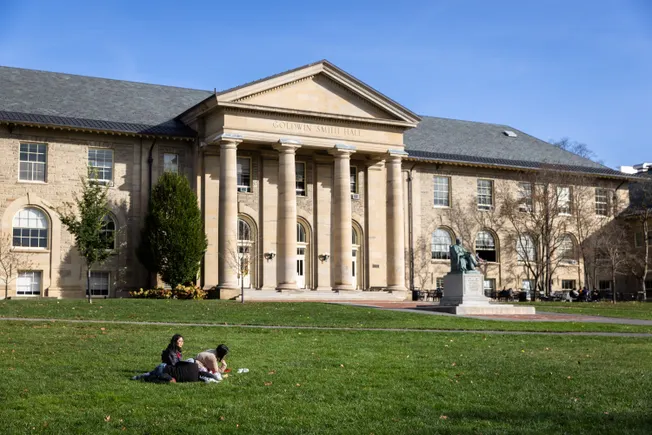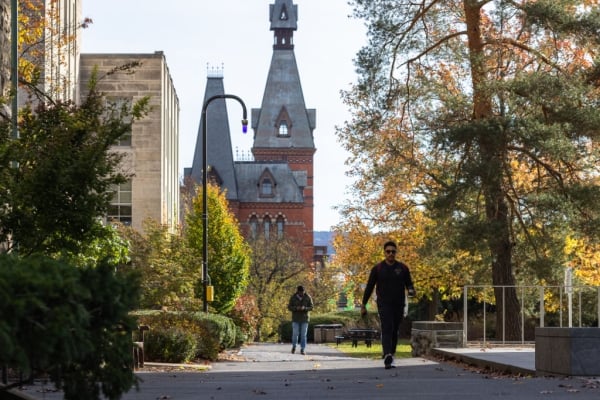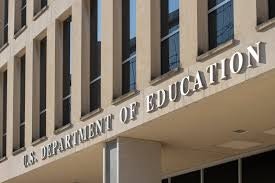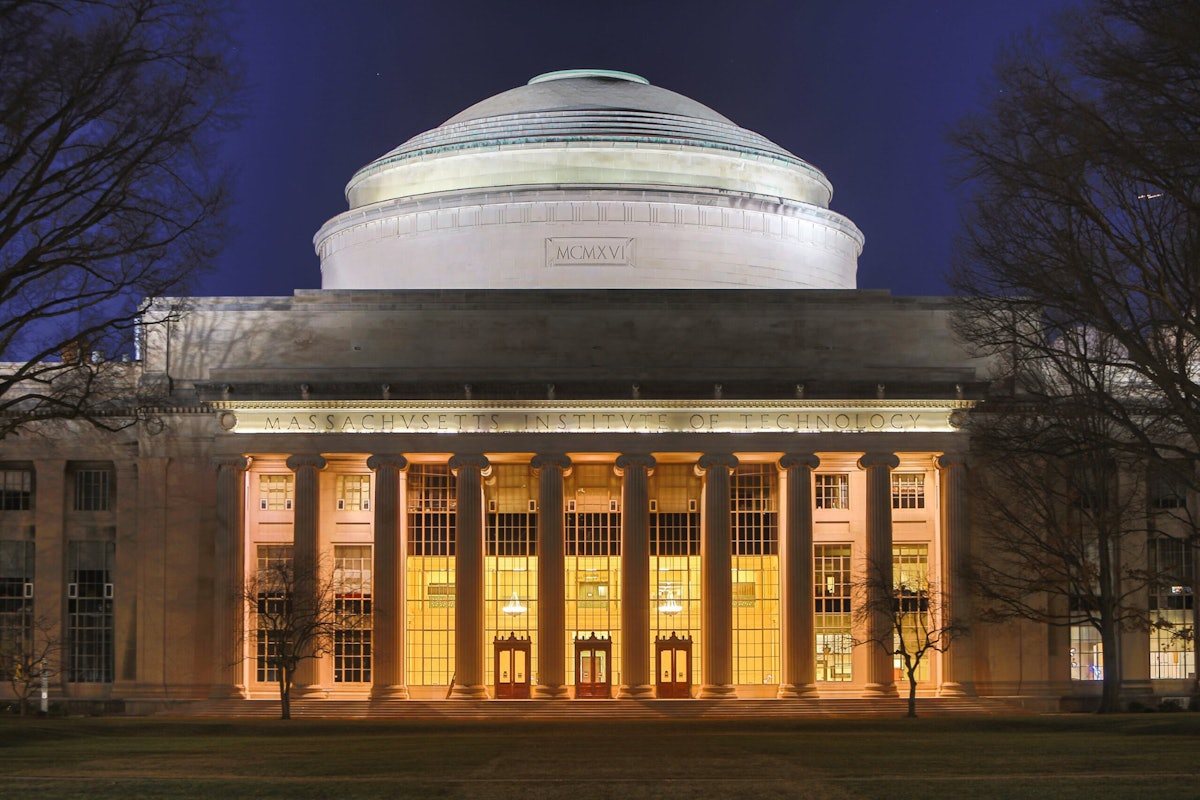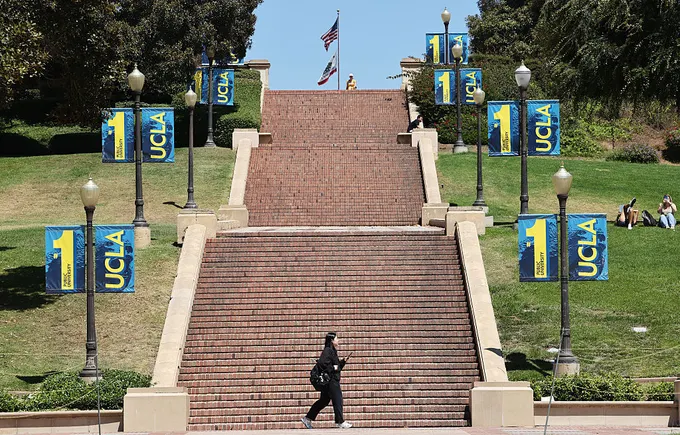In an effort to address a deep deficit caused by rising costs, declining international enrollment and flat state funding, University of Nebraska–Lincoln officials have proposed merging or cutting a slew of programs. But one proposal has sparked particular outrage—within the university and beyond: the plan to ax the educational administration department.
If the plan goes through, faculty members and students worry the state will be left without a key pipeline to fill leadership roles at local schools and colleges, particularly in rural areas. The University of Nebraska–Lincoln is the only university in the state that offers a Ph.D. program in educational leadership or higher education, which has a distinct scholarly focus, while Ed.D. programs and master’s degrees to train education leaders can be found elsewhere.
“It’s hard for me to imagine the flagship university in a state does not offer a program to prepare future principals, future superintendents, future leaders of colleges and universities,” said Crystal Garcia, an associate professor and Ph.D. coordinator in the department. Eliminating the department would be “really doing a disservice to education as a whole in the state of Nebraska.” She noted the department is “incredibly impactful,” serving 316 current and incoming graduate students.
Administrators have proposed nixing five other academic programs as well: community and regional planning; earth and atmospheric sciences; landscape architecture; statistics; and textiles, merchandising and fashion design. The plan would potentially retain the master’s degree program in educational administration but rehouse it elsewhere.
Through these cuts, the university aims to reduce the budget by $27.5 million, in part by eliminating 58 roles—17 from the educational administration department, including tenured and tenure-track positions. University officials also proposed two department mergers and budget cuts to the College of Engineering and the College of Arts and Sciences, amid other cuts to administrative and staff expenses.
The proposal will now be considered by the Academic Planning Committee, a group of faculty, staff and students. Members of affected programs can make their case before the committee in live-streamed hearings, and the public can weigh in through a feedback form. Then, the APC will come out with recommendations the chancellor can take or leave. If the chancellor decides to move forward with the proposed cuts, the issue will come before the Board of Regents in December.
Elizabeth Niehaus, a professor in the educational administration department, said faculty were stunned by the news and are preparing to defend the department to the committee—and the Board of Regents if need be. She and other faculty members believe the department is thriving.
The proposed cut was “quite honestly shocking, because we are a strong department with great students, great faculty, with a national reputation, folks who have been winning awards for teaching and research,” Niehaus said. “So, we did not see that coming.”
The Decision-Making Process
The university’s executive team undertook “a strategic, data-informed and holistic review of all academic programs,” said Mark Button, UNL’s executive vice chancellor.
The review weighed a variety of metrics, he said, including student success outcomes—such as retention rates and degree-completion rates over a five-year period—the ratio of student enrollments to faculty members, and demand for programs as measured in student credit hours and students joining majors.
Administrators also drew on metrics for research success used by the Association of American Universities; the university is seeking to regain membership in the organization, which it lost in 2011. Those measures include book publications, research citations and awards and fellowships. Administrators also compared programs to similar programs at other public AAU institutions, Button said, and considered more qualitative factors, like whether a program was distinctive in the state. The metrics were shared with college deans and then department chairs in May.
Button said the metrics used to review the academic programs reflected priorities already in the university’s strategic plan and the criteria used for past budget reductions. Education administration was among the departments that “didn’t perform as well,” he said.
Faculty members argue the process lacked transparency; they didn’t know until a day before the proposal came out that the department was on the chopping block. They say their specific questions have gone unanswered, including which particular measures caused them to fall short and whether the pandemic years were contextualized in the data.
“We were reduced to a single number that definitely does not reflect the depth and breadth of what we do and our contributions to the field, to the university, to the state,” Niehaus said of the scoring process.
The decision felt so at odds with how the department sees itself that associate professor Sarah Zuckerman said she wondered if it was being targeted for its outspoken faculty members. Zuckerman, who serves as president of the university’s chapter of the American Association of University Professors, said other members of the department are also active in the organization, as well as in Advocating for Inclusion, Respect and Equity, a faculty coalition focused on diversity issues.
“It gives me a little bit of a nauseous feeling,” Zuckerman said.
Button argued it’s “definitively not true” that the proposed cuts target outspoken departments. He said the proposal involved “very painful decisions.”
“I probably can’t underscore enough just how difficult this budget-reduction process is for our entire university community and for everyone who’s committed to an outstanding land-grant, flagship, Big Ten university here in Nebraska,” Button said. “I share the sense of pain and grief that everyone on our campus is going through now.”
If the cuts become a reality, tenured and tenure-track professors will have a year’s notice of their termination and the university has promised to develop teach-out plans for students. But students don’t have the details of those plans, and some said the uncertainty makes them ill at ease.
Korrine Fagenstrom, who is participating in the online Ph.D. program focused on higher ed administration from Montana, said she doesn’t know what she’s going to do.
Four years into her program, she doesn’t want to leave, she said, but “I don’t know what it would look like to stay—I don’t know that anybody does.”
“The idea of the program getting eliminated at my final hour is terrifying,” said Kathryn Duvall, a third-year student in the Ed.D. program. “I have made sacrifices to my family. I have made sacrifices to my own personal life and dedicated years to getting my education. And this program has spent years pouring into me and developing me as a researcher, as a writer, as an educator, as a leader.”
She also worries on a “macro level” that education in the state will suffer without the leadership training UNL provides.
“Eliminating a program like this is eliminating foundational training that produces equitable educational opportunities in our society,” Duvall said.
The Bigger Picture
University officials argue that other offerings in the state, such as Ed.D. programs at University of Nebraska–Omaha or small private universities, can fill the same needs as UNL’s educational administration programs.
But K–12 superintendents, who generally have doctorates, need more—not less—access to the affordable, high-caliber training public institutions like UNL historically provide, said Mónica Byrne-Jiménez, executive director of the University Council for Educational Administration. The proposal to cut the department has garnered national attention, because it’s an unusual move for a flagship campus or a university with a Research-1 Carnegie classification, she added.
“It’s nothing I’ve seen before,” Byrne-Jiménez said, noting most R-1 universities boast strong K–12 and higher ed leadership programs. “We don’t want it to become a national trend.”
Cheryl Holcomb-McCoy, president and CEO of the American Association of Colleges for Teacher Education, said that while UNL is a “unique case,” she has seen a growing number of education schools or colleges merge with other programs over the last decade. The Iowa Board of Regents also approved plans last week to end the University of Iowa’s graduate and doctoral programs in elementary education, secondary education, special education and science education.
She worries that federal funding cuts, particularly to teacher training grants and Institute of Education Sciences contracts, is going to thrust more universities into positions where they consider taking such actions.
Byrne-Jiménez said such programs may be extra vulnerable at a time when Americans are questioning the value of higher education and schools are “hyperscrutinized.” Educational administration programs also tend to attract smaller cohorts, she said, because a select few want to go into education leadership roles. She fears their size, combined with national skepticism, makes them susceptible to budget cuts. But she believes these programs have an outsize effect on the long-term success of state residents that needs to be considered.
“From an external perspective, it looks like these are small, sort of niche programs that might not be generating a lot of money for the university,” she said. But “the impact is great.” At UNL, “those 300 students are going to go out to 300 schools and 300 communities.”

